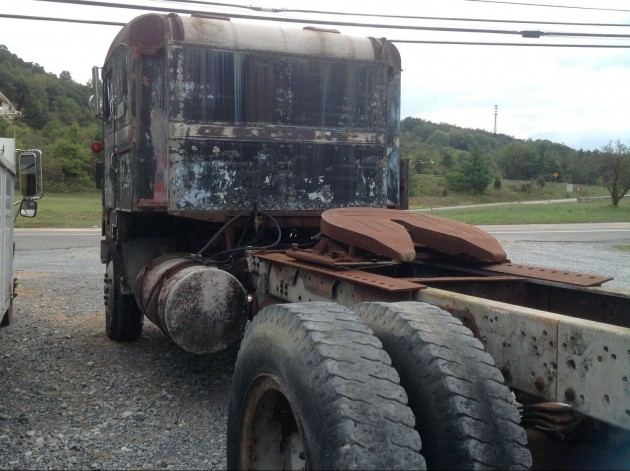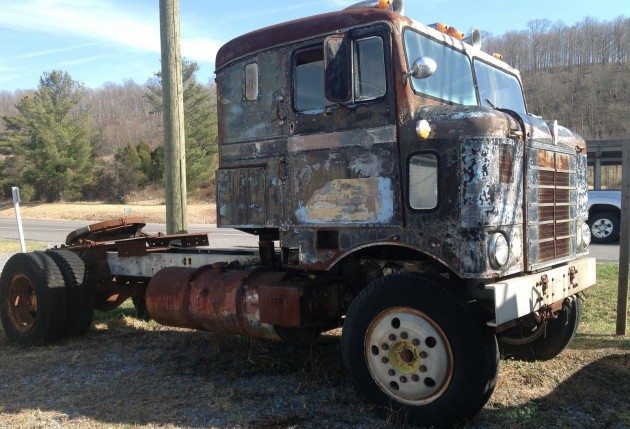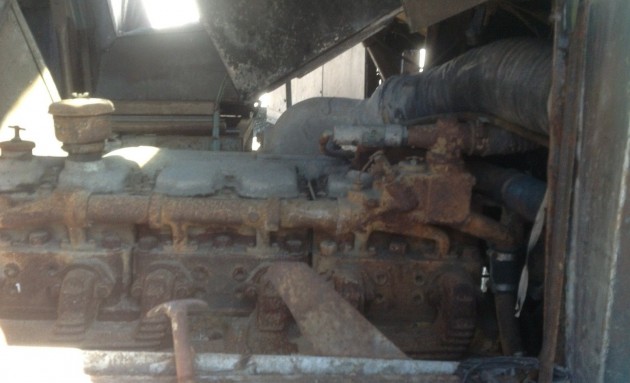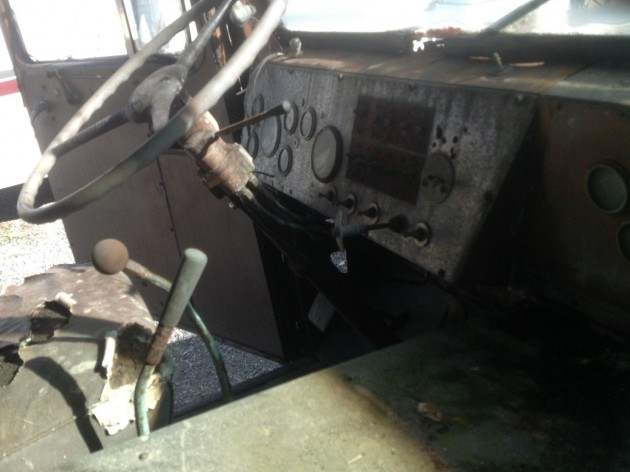If you’re a producer of heavy-duty commercial vehicles, you’ll want to build a rig that truckers love. Key elements of that recipe include durability and engineering ingenuity, two qualities this 1950 Kenworth Bull Nose sleeper cab here on eBay possesses in spades. This is clearly a project, but I think it’s more a case of well-aged cosmetics that makes this truck look rougher than it is. There’s a reserve number and an opening bid of $4,500 with no action at the moment.
The seller bought the truck from the original owner, but due to health problems, cannot complete the restoration. The Cummins powerplant was a trusty stead to the former 80-year-old prior owner, who used it to haul chickens weekly to Dallas. The seller has never actually heard the truck run but claims it isn’t stuck. It also comes with the original fifth wheel and features a 5 + 3 transmission. The 200,000 mile odometer reading is likely very low compared to what these trucks are expected to do over their lifetime.
There’s nothing pretty in the interior, but I suppose hauling chickens can be a messy job, so why risk ruining wood trim and high-grade vinyl? Of course, those features were likely never options to begin with when spec’ing out trucks like these in the 1950s. Today, there’s no shortage of luxuries you can add in to tractors made by the likes of Volvo, Peterbilt and Freightliner. The fact that this Bull Nose came with sleeping quarters was probably considered more than enough luxury when new!

When we’ve featured trucks in the past, our readers have shown themselves to be quite well-versed in the specifications, models and history of various tractor cabs. While this Bull Nose looks like a great foundation to me, we’ll look forward to your comments either supporting or debunking that theory! Of course, the bidders will also have a say in whether this Kenworth returns to the highways and byways – maybe there’s a chicken farm in need of a new hauler?







I saw one just like this in the bottom of a rock quarry.
Under water.
Well let’s see if I buy the COE with trailer full of 56 Chevys, the Bobcat and trailer, The Big Red Dump Truck, and now this Bull Nose Kenworth I better get off my lazy but and move back to the country as my neighbors are not going to be happy.
That is real mans semi truck none of that sissy stuff like power steering our power brakes our aircond
Nope, it IS rougher than it looks. Good heavens, I don’t know where to begin. These may be rare, but not that rare, and believe it or not, there are still a few around. Several of these usually show up at truck shows. The best thing to do with this, is like the person said, put this cab on a more modern frame. It’s too far gone. Every system will have to be rebuilt and heavy truck parts are very expensive. Aluminum frames have a tendency to crack, tube tires, outdated wedge style brakes, manual steering, engine ridiculously out of date,( I believe it’s a 220 Cummins) and good luck finding any interior parts. There was a time when this was the “Cadillac” of trucks, but this is pretty shot. Cool find, but I’m glad I never had to run a truck like this, and I’ve driven some pretty tired trucks. One cool feature, up in the corner of the driver’s windshield, you see what looks like a stop sign, that was the “low air” signal. When full of air, the stop sign would raise up, and low air would drop down. Many a old-timer began to sweat, if that sign dropped down. No back up air system back then.
I would think, seeing the stop sign while rolling down a hill would be terrorizing. Did rigs this old have anything similar to a Jake Brake?
Hi Ed, oh yeah, I’m sure there were some white knuckles back then. Unlike modern air brakes, that apply themselves when air is lost, years ago, no air, meant no brakes. The engine brake was developed by Clessie Cummins in 1954,( after narrowly escaping death when the truck he was driving lost it’s air brakes on the Cajon Pass) and no truck maker wanted it. His son contacted Jacobs Mfg., ( of drill chuck fame) and they have been making “Jake” ( short for Jacob) brakes ever since. So no, I’m not sure the 220 could be adapted to use an engine brake. ( geomechs???)
My dad’s Kenworth Conventionals had 220 Cummins with Jakes. On 855 Cummins they are obvious, they fit sandwiched between the head and valve cover. On a Detroit you have to pull the valve covers to see them. They have always been an item retrofitted to engines….sometimes at the factory but not supplied by the engine manufacturer. They are much more common in the West than the east for obvious reasons. The best use for this old girl is as a chicken coop.
Hi guys. The N-series Cummins (comprising the 195/220 and up) was the first to use the Jake Brake. It was the test bed when Clessie Cummins developed it. You’re right, Howard. Clessie tried to sell his brake to Cummins who turned him down flat. Jacobs picked it right up and never looked back. Interesting that Cummins eventually came out with the ‘C-Brake,’ which they worked on forever to get to work half as effectively as the Jake. But the C-Brake was supposedly quieter. I think that was because it seldom worked properly.
Well Mr. Cummins had the idea in the late 30’s but I don’t think he sold it to Jacobs until after he retired. So they probably didn’t have them in 1950.
Yeah, Clessie played around with the idea when the H-series was in its infancy. The war got in the way so development got delayed. I don’t have any information confirming if there was a Jake available on the H and HB engines, but the 4-valve N-series was a perfect platform for it.
Modern chassis and a flatbed would make a great project hauler!
Agreed. Take the sheet metal and stick on top of something that runs & drives. Retain as much of the original interior look and feel. Talk about hot rod truck! It could be so cool. Looks great as it is.
I’ve seen some amazing truck collections and while this one would be a challenge, a purist would be right at it, doing whatever it needed to get it back in roadworthy condition. That engine looks to be either a 195 or a 220. I’m sure if you saw the left side you would see that it still ran the external fuel rails. I doubt if it would be running the disc fuel system yet, although that vintage still ran them but they were nearly all converted to the Pressure Time (PT) system by the early 50s.
Here’s a typical 195/220 with the disc system still intact.
Wow! Great comments folks! I love learning more about heavy trucks. I’ve definitely seen worse, but this would still be a whale of a restoration. It would be great to see some crazy person save it though!
Didn’t realize this site had become old truck finds!!!
STFU. please. :)
jake: join in, have fun, learn something, or go to sleep.
I had a 1960 pete it was one of the first with a tilt cab. It had a 220 cummins and a spicer 12 speed. It was an old PIE truck with pad suspension. It was sitting in the back of a Kenworth dealers lot and wouldn’t start. I made an offer for 1400.00 including towing to my home about 30 miles away. I flushed the injectors and bled them and it started right up and ran like a top. Pretty crude but I put it to work until I wrecked it.
I’d love have that old sweetheart. Nothing looked meaner coming at you than a Bullnose KW. Heck, just those original five-hole Budd wheels would be nice to have!